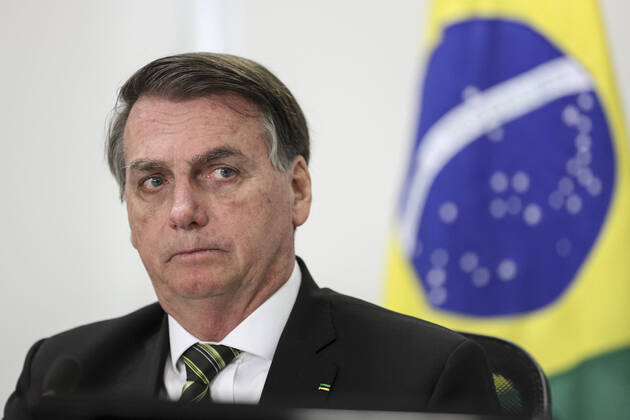Protestors Attack Government Buildings in Brasilia
Claimed fraud in Brazil’s recent elections, reminiscent of the 1/6 attack in the U.S.
Outgoing Brazilian President Jair Bolsonaro.
On January 8th, Brazilian protestors challenged democracy by storming government buildings in Brazil’s capital, Brasilia. This conflict arose from angry protestors claiming the results of the October presidential election between Jair Bolsonaro and Lula da Silva were fraudulent.
Bolsonaro, who was Brazil’s president from 2019 to 2022, is a conservative pro-militarypro-military politician. When he ran for president in 2018, he gained religious support because of his opposition to abortion and also appealed to people concerned about crime. He had a large social media presence that allowed him to further his campaign and expand his audience. During his presidency, he focused on changing the age for former government officials to receive pensions to reduce government spending and deforesting the Amazon rainforest. He was known for his homophobic, misogynistic, and racist comments. He finished off his presidency by discouraging people to wear masks and social distance during the COVID-19 pandemic, which led to Brazil being one of the countries to suffer most throughout the outbreak, logging over 35 million COVID cases.
Lula de Silva is a representative of the Workers Party and served as president of Brazil from 2003 to 2011. He hoped to achieve economic growth and social and governmental reforms. His presidency was marked by new opportunities in oil revenue, the upcoming 2016 Olympics, and general economic improvement. His career was marred in 2016 and 2019 by his association to the Petrobras scandal, the largest showing of corruption in any democracy worldwide. He was convicted to serve over 20 years in prison and could no longer run for office. He was chosen as a candidate for president in 2018 but was unable to participate, which contributed to Bolsonaro’s victory. In 2021, Brazil’s Supreme Court dismissed the charges against Lula, allowing him to participate in the 2022 election.
The election was very close, resulting in Lula’s success with only 50.9 percent of the vote. Bolsonaro lost with 49.1 percent. Bolsonaro and his supporters responded by refusing defeat and alleging election fraud. The main accusations were against the validity of Brazil’s electronic voting system, which has been in place since 1998. Protests ensued throughout the country against injustice and supposedly to protect democracy. Protestors blockaded thousands of roads and camped outside of military buildings calling for a military coup to overthrow Lula. Additionally, there appeared to be some companies financially assisting the protestors as well as government employees allowing them to access buildings. The protests eventually became violent, but Bolsonaro, who is currently residing in Florida and facing the potential loss of his visa while U.S. officials investigate the protests, had very little to say except that the protestors should avoid “impeding the right for people to come and go.”
The unrest culminated in the attack in Brasilia’s Three Powers Square. This square represents the Brazilian government, with the presidential office, national congress, and the federal supreme court all located there. Thousands of protestors dressed in the colors of Brazil and waving flags broke into these three mostly empty buildings, proceeding to vandalize, loot, and wreck them. The police and military responded but had trouble calming the large crowds. Tear gas, rubber bullets, and other non-fatal weapons eventually helped conclude the unfortunate event as 1,500 people were arrested and Bolsonaro remained relatively quiet.
Lula has angrily responded by criticizing Bolsonaro’s unwillingness to accept defeat in October’s election, which he says pushed Bolsonaro’s supporters to act out. He also stated that the rioters who committed crimes would be punished. Brazil is actively enforcing safety precautions to prevent any future events similar to this one from occurring.
This event eerily mirrors the January 6th attack on the U.S. Capitol. The two events share similar rhetoric and shocking violence just two years apart. The attack in the United States was not only on government buildings but also on government officials who were certifying the 2020 election. The intense opposition between political parties is pulling nations further away from democracy. January 8th in Brazil will be another day in history forcing the world to acknowledge the fragility of democracy and showing how easily it can be knocked off balance.

Sydney Marks ‘24 is the Advocate’s School and Local editor, and she’s been writing for us since 2021. In her free time she likes to be a part of...







